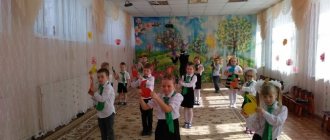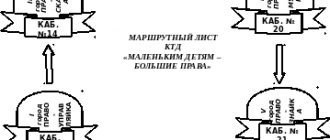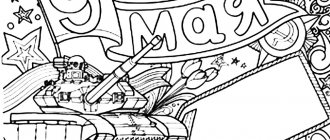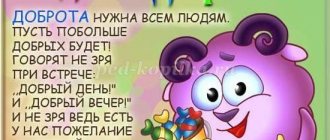Games are the main activity of preschoolers. Through this type of activity in the educational process, the implementation of training, developmental and educational goals is carried out when considering the topics provided for in the work program. And if we are talking about topics studied annually, then the teacher’s task is to select games and competitions that would be interesting and feasible for children of a particular age. Let's look at the selection for Victory Day.
- 2 A selection of games for younger groups
2.1 Table: didactic games on the theme “Victory Day” for younger preschoolers2.1.1 Photo gallery: materials for the games “Defenders of the Fatherland”, “Find the Shadow” and “Postcard for a Veteran”
- 2.2.1 Video: outdoor games at the “Victory Day” matinee in the younger group
- 3.1 Table: didactic games on the theme “May 9” for the middle group
3.3.1 Video: dramatization “We are warriors too” with children of middle preschool age
- 4.1 Table: didactic games on the theme “May 9” for older preschoolers
4.2.1 Video: outdoor game “Help the Wounded” in the senior group
Types of games on the theme “May 9”
Based on the fact that gaming activity accompanies all methods of organizing educational activities, the theme “Victory Day” is implemented in the following types of games:
- didactic (in verbal, board and printed games, games with objects);
- outdoor activities (in team and individual competitions, attention games);
- theatrical (in dramatizations, including to illustrate physical education lessons).
Games on the theme "Victory Day" usually have musical accompaniment.
Educational, that is, didactic games, are used mainly in the process of educational activities or when performing routine tasks (for example, verbal games can be played while walking), while active and theatrical games are more focused on organizing leisure activities: matinees, sports festivals.
At the same time, the goals of gaming activities in the context of the “Victory Day” theme will be common:
- gaining knowledge about the history of the country;
- development of speech, thinking and basic physical abilities;
- instilling a sense of pride in the heroism of the people during the Second World War.
These goals are specified in the context of each type of game for all age groups.
Games on the theme “Victory Day” can be held not only indoors, but also outdoors
Quilling - unusual and simple
Another method that has found wide application in the field of creativity of primary school students and preschoolers.
Everything is quite trivial - paper or fabric is rolled into a spiral, turning into a three-dimensional part.
We recommend reading:
Easter crafts: the best ideas for DIY gifts and decorations (90 photos + video)Autumn crafts - 100 photos of themed crafts for children's creativity. Review of the best ideas and new products to create at home
Crafts for children 9 years old: simple and interesting ideas for crafts (85 photos)
Small cylinders serve as a kind of construction set from which you can assemble anything.
Military crafts for school can be made in different versions:
- The spirals are glued onto a cardboard base - a three-dimensional applique is obtained;
- The cylinders are stitched or glued into a model - a tank, an airplane, a car;
- Details complement the craft and serve as part of it.
A selection of games for younger groups
The tasks of studying the topic “May 9” in the first and second junior groups have a common direction related to the formation of a conceptual base, therefore games for children 1.5–4 years old in the methodological literature are combined into one block.
Table: didactic games on the theme “Victory Day” for younger preschoolers
| Name of the game | Attributes | Conditions |
| “Defenders of the Fatherland”/verbal | Pictures depicting military vehicles. |
|
| “One-many”/verbal | The teacher names the object in the singular, the child answers in the plural (airplane - airplanes, tank - tanks, etc.). | |
| “Who serves in the army”/verbal | Ball |
|
| “Find the shadow”/tabletop printed | Pictures depicting military equipment and shadows of vehicles. |
|
| Puzzle “Postcard for a Veteran”/desktop-printed | Postcard cut into 4–6 pieces |
|
Photo gallery: materials for the games “Defenders of the Fatherland”, “Find the Shadow” and “Postcard for a Veteran”
For children of primary preschool age, the picture for the puzzle is cut into 4 or 6 parts, depending on the general level of development of the children
The game “Find the Shadow” can be made competitive
The game "Defenders of the Fatherland" trains children's reactions
For the game “Defenders of the Fatherland” you can take up to 6 pictures
In the game "Defenders of the Fatherland" children get an idea of the grammatical structure of the language
Table: thematic active and theatrical games for younger preschoolers
| Game name/type | Attributes | Conditions |
| “Find Yourself a Pair”/individual competition | Colored handkerchiefs and tokens according to the number of children. |
|
| “Road of Life”/team competition (relay race) |
|
|
| “Knock down the pin”/individual competition |
|
|
| “Salute”/re-enactment of physical education (theatrical game) |
| |
Video: outdoor games at the “Victory Day” matinee in the younger group
The holiday is coming - how to prepare?
Dates such as February 23 and May 9 rarely go unnoticed by educators. Legal holidays for adults coincide with creative competitions and developmental events in schools and kindergartens.
A child’s request to help with a craft should not come as a surprise to parents, so it’s worth stocking up on:- Free time. Yes, creativity cannot be rushed. It is necessary to discuss all possible options with the young family member and provide support at all stages.
- Inspiration. Photos of military crafts, themed films, lessons - excellent food for creative thought.
- Materials. Paper, glue, wood, plastic - everything goes into use! Choices should be limited only by reasonable precautions and imagination.
- Patience. Not every project succeeds the first time - even a children's craft.
A selection of games for the middle group
At the age of 4–5, preschoolers enrich their understanding of the Victory Day holiday, the Second World War, and practice the skill of accurately and quickly performing game actions.
Table: didactic games on the theme “May 9” for the middle group
| Game name/type | Attributes | Conditions |
| “The fourth wheel”/verbal | The teacher writes blocks of words on the board, the child finds the odd one out and explains his choice:
| |
| “Say the opposite”/verbal | The teacher names the word, the child answers with an antonym:
You can use a ball in the game: an adult throws a ball to a child, who catches it and returns the ball. | |
| “Labyrinth”/desktop-printed | Thematic pictures | Children determine the correct road for the border guard who is going to his outpost, and mark this path with a pencil. |
| “Who can assemble the border pillar faster”/game with objects | Designer parts in red and green (10 pieces each). | Children in two teams assemble a border post from construction kit parts (five red and five green). |
| “Guess”/verbal | The teacher names the details of military equipment, and the children determine what they are talking about:
| |
The game "Labyrinth" can be played as a timed competition
Table: thematic outdoor games in the middle group
| Game name/type | Attributes | Conditions |
| "Crossing"/team competition | Ball |
|
| Sniper/competition (individual or team) |
|
|
| Obstacle course/individual competition | Gymnastic hoops |
|
| “Walk the Trail”/individual competition | Rope |
|
Thematic games help foster a competitive spirit in children
Table: theatrical games on May 9 for the middle group
| Game name/type | Attributes | Conditions |
| “Sailors”/role-playing |
|
|
| “We are warriors too”/dramatization based on a poem by S. Mikhalkov |
|
|
Video: dramatization “We are warriors too” with children of middle preschool age
For professionals
Many elementary school students manage to master outstanding skills before school. You can’t ignore them, because they can become a source of wonderful crafts:
- Wood burning will ideally complement decoupage, giving it a finished look;
- Modeling is an excellent source of models of military equipment and weapons. Products made from plaster and clay can exactly replicate the original, look great and last a long time;
- Crafts made from dough and polymers look unusual, and the original approach will be appreciated.
Any child, on a subconscious level, knows well how to make military crafts. It is important to encourage creativity and come to the rescue in time if the situation requires it.
A selection of games for older preschool age
As in the case of younger preschoolers, the tasks of studying the topic “Victory Day” for children in the senior and preparatory groups are consonant: to summarize materials related to the events of the Second World War, to stimulate interest in studying the history of the country and their family, so the games can also be grouped into one common selection.
Table: didactic games on the theme “May 9” for older preschoolers
| Game name/type | Attributes | Conditions |
| “What a real soldier should be”/verbal | Ball (optional) |
|
| “Who can assemble a machine gun faster” / desktop-printed | Picture puzzle of 10–16 elements |
|
| “Name the proverb”/verbal | Ball | The teacher throws the ball, the child catches it and calls out the proverb, explaining how it fits the topic:
|
For the game “Who can assemble the machine faster,” the picture is cut into 10–16 parts
Table: themed outdoor games for older preschoolers
| Game name/type | Attributes | Conditions |
| "Who is faster"/team competition |
| There are things on two chairs. At a signal, two children - representatives of different teams - begin to get dressed. The one who can do it faster and better wins. |
| Shoot down the enemy plane/team competition |
|
|
| “Help the wounded”/individual competition |
|
|
| Fast Boat/Individual Competition |
|
|
| "Scout"/game for attention |
| |
| "Tails"/individual competition | Small pieces of rope according to the number of participants. |
|
Video: outdoor game “Help the Wounded” in the senior group
Table: theatrical games for older preschoolers
| Name of the game | Attributes | Conditions |
| "Hospital" |
| Children replay the entire procedure of a wounded soldier entering a hospital, being admitted, providing assistance, filling out a card, etc. |
| "Scouts and Foot Soldiers" |
|
|
In the older group, games of different types are combined into one plot, for example, a quest to find a hidden task
Games have invaluable methodological potential for realizing the goals and objectives of the educational process. Moreover, both in the GCD format, and during matinees, leisure activities, and when performing routine tasks. With the help of the game, children more easily perceive material even on such a complex topic as “Victory Day,” which, according to the Federal State Educational Standard, is studied by preschoolers of all age groups.
For the little ones
Kindergarten is not demanding on results, so you can get by with little effort. Soft colored paper is simple and interesting.
With the help of scissors, glue and pencils, even the youngest artists can do:
- Small paintings;
- Holiday cards for an important date. The most popular is the “book” version, with a bright cover and congratulatory text inside;
- Fun and colorful appliques. This type of military craft for kindergarten is the most common;
- Origami - flexible children's hands can turn a piece of paper into a complex three-dimensional toy.
We recommend reading:
- Natural vitamin supplements - do we really need them?
- Metalworking catalog
- Who is better to buy links from?
Receiving such a gift is a very pleasant event for any man. Such crafts do not take up much space and can please the eye for a long time.
The most successful options win competitions and are put on public display in children's libraries, kindergartens, and clubs.





